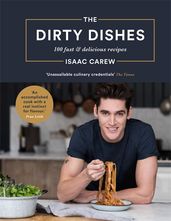Synopsis
'A really great kitchen companion, full of easy-to-follow tasty dishes based on good-quality ingredients.' – Gizzi Erskine
Classically trained chef and model Isaac Carew takes it back to the kitchen with his debut cookbook The Dirty Dishes, featuring the fun, delicious and tasty food that’s inspired his life-long love of cooking.
The Dirty Dishes is a fresh and modern collection of one hundred recipes: from lazy brunches to easy weekday suppers, and from vegan delights to late-night bites. He shares new takes on classics including Poached Salmon Niçoise, celebrates his love of pasta with Lasagne, Crab Linguine and Butternut Squash Cannelloni, and introduces more adventurous yet surprisingly easy recipes like Tamarind Treacle Tart. Bursting with flavour, the book reveals the secrets of Isaac's culinary training and gives you everything you need to get a bit messy and have fun in the kitchen.
Isaac's dad and godfather both worked in kitchens, so Isaac grew up washing mussels and leafy greens. He qualified as a chef in his teens and went on to work in some of the best restaurants in the world. Since then, via a high-profile modelling career, Isaac has nurtured his passion for great cooking and diverse food with the fashion capitals as his inspiration.
'Unassailable culinary credentials.' – The Times
Details
Reviews
Written by an accomplished cook with a real instinct for flavour.
He has unassailable culinary credentials that put him head and shoulders above your average selfie-prone Instagram feeder.
This simplicity of these recipes combined with Isaac’s passion of cooking makes Dirty Dishes a must-have book for every kitchen table.
A really great kitchen companion, full of easy-to-follow tasty dishes based on good-quality ingredients.

